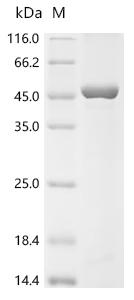Recombinant Human Formin-2 (FMN2) , partial
CAT:
399-CSB-EP873702HU-01
Size:
20 µg
Price:
Ask
- Availability: 24/48H Stock Items & 2 to 6 Weeks non Stock Items.
- Dry Ice Shipment: No




Recombinant Human Formin-2 (FMN2) , partial
- CAS Number: 9000-83-3
- Gene Name: FMN2
- UniProt: Q9NZ56
- Expression Region: 1284-1673aa
- Organism: Homo sapiens
- Target Sequence: KQPIEPCRPMKPLYWTRIQLHSKRDSSTSLIWEKIEEPSIDCHEFEELFSKTAVKERKKPISDTISKTKAKQVVKLLSNKRSQAVGILMSSLHLDMKDIQHAVVNLDNSVVDLETLQALYENRAQSDELEKIEKHGRSSKDKENAKSLDKPEQFLYELSLIPNFSERVFCILFQSTFSESICSIRRKLELLQKLCETLKNGPGVMQVLGLVLAFGNYMNGGNKTRGQADGFGLDILPKLKDVKSSDNSRSLLSYIVSYYLRNFDEDAGKEQCLFPLPEPQDLFQASQMKFEDFQKDLRKLKKDLKACEVEAGKVYQVSSKEHMQPFKENMEQFIIQAKIDQEAEENSLTETHKCFLETTAYFFMKPKLGEKEVSPNAFFSIWHEFSSDFK
- Tag: N-terminal 10xHis-tagged and C-terminal Myc-tagged
- Source: E.coli
- Field of Research: Cell Biology
- Assay Type: Developed Protein
- Relevance: Actin-binding protein that is involved in actin cytoskeleton assembly and reorganization. Acts as an actin nucleation factor and promotes assembly of actin filaments together with SPIRE1 and SPIRE2. Involved in intracellular vesicle transport along actin fibers, providing a novel link between actin cytoskeleton dynamics and intracellular transport. Required for asymmetric spindle positioning, asymmetric oocyte division and polar body extrusion during female germ cell meiosis. Plays a role in responses to DNA damage, cellular stress and hypoxia by protecting CDKN1A against degradation, and thereby plays a role in stress-induced cell cycle arrest. Also acts in the nucleus: together with SPIRE1 and SPIRE2, promotes assembly of nuclear actin filaments in response to DNA damage in order to facilitate movement of chromatin and repair factors after DNA damage. Protects cells against apoptosis by protecting CDKN1A against degradation.
- Purity: Greater than 85% as determined by SDS-PAGE.
- Activity: Not Test
- Length: Partial
- Form: Liquid or Lyophilized powder
- Buffer: If the delivery form is liquid, the default storage buffer is Tris/PBS-based buffer, 5%-50% glycerol. If the delivery form is lyophilized powder, the buffer before lyophilization is Tris/PBS-based buffer, 6% Trehalose, pH 8.0.
- Reconstitution: We recommend that this vial be briefly centrifuged prior to opening to bring the contents to the bottom. Please reconstitute protein in deionized sterile water to a concentration of 0.1-1.0 mg/mL.We recommend to add 5-50% of glycerol (final concentration) and aliquot for long-term storage at -20℃/-80℃. Our default final concentration of glycerol is 50%. Customers could use it as reference.
- Molecular Weight: 50.0 kDa
- Storage Conditions: The shelf life is related to many factors, storage state, buffer ingredients, storage temperature and the stability of the protein itself. Generally, the shelf life of liquid form is 6 months at -20℃/-80℃. The shelf life of lyophilized form is 12 months at -20℃/-80℃.
